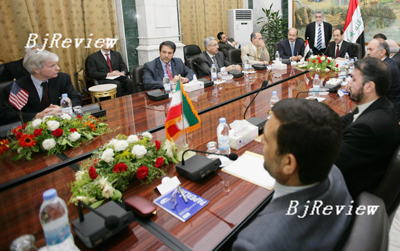
After 27 years of a palpable coolness toward each other, Iran and the United States have now been compelled to sit at the negotiation table, courtesy of the Iraq situation. The U.S.-Iran ambassadors' meeting, held in late May, appears to be a sure-footed beginning in a new direction.
On May 28, for the first time since diplomatic relations were severed in 1980, the two countries convened in Baghdad for what is now seen as a historic summit. The talks, hosted by Iraqi Prime Minister Nuri al-Maliki and attended by the two ambassadors to Iraq, U.S. Ambassador Ryan Crocker and Iranian Ambassador Hassan Kazemi Qomi, were designed to focus purely on the Iraqi issue and the means to stabilize the war-torn country. The Iraqi Government said earlier that it had been encouraging both sides to launch a dialogue and settle the problems that have impacted the Iraqi situation negatively. Al-Maliki confirmed that his government was "keen that the Iraqi issue be exclusively discussed in the dialogue."
Although no actual agreement was reached or statements signed, the meeting was considered a milestone, not only by the two countries but also by international relations observers. Crocker made a statement after the meeting that his talks with his Iranian counterpart Qomi had been "positive" and that both parties had agreed to work toward a stable Iraq.
"The talks ended positively, and what we need to see is Iranian action on the ground," Crocker told a news conference, adding that the atmosphere surrounding the conference had been "business-like."
"There was pretty good congruence down the line," he said. "There was support for a secure, stable, democratic and federal Iraq, in control of its own security and at peace with its neighbors."
The Iranian ambassador also hailed the talks as "positive" in a separate news conference, saying the two sides had agreed to support and strengthen the Iraqi Government. Ali Akbar Velayati, special advisor to Iran's Supreme Leader Ayatollah Ali Khamenei, said on May 29 that his country had adopted a proactive diplomacy to help restore Iraq's security, adding that the meeting was a token of understanding shown by Iran.
Analysts said that although the high-profile talks achieved no breakthrough, exactly as U.S. and Iranian officials had predicted, it marked a shift in U.S. policy toward Iran on the Iraqi issue.
What lies beneath
Long years of hostility between the two may have drastically harmed the situation in the strife-torn region, but the wounds are far from fatal, say experts; the Iraqi issue, if nothing else, is a good excuse to jump-start renewed negotiations.
"It shows at least that the two sides want to talk," said Liu Yueqin, a scholar with the Division for International Relations of the Institute of West Asian and African Studies, Chinese Academy of Social Sciences. "The meeting itself is a great achievement in terms of diplomatic effort. We can't say, however, that they made active moves, because the two sides, especially the United States, were forced to the negotiation table by the regional situation."
She expounded her claim by saying that the United States had been cornered by Iran, because Iran was now the most noticeable power in the Middle East, exerting a great influence on neighboring Iraq; after Saddam Hussein was pulled down, the Shiites, who had close ties with Iran, came into power. On some level, Liu said, America trapped itself in its current dilemma due to poor decision-making. In late 2006, the Iraq Study Group, established by the U.S. Congress to review the war, issued a report on Iraq reconstruction and drafted the U.S. reconstruction plan. "If America had discussed the plan with Iran and Syria, the whole situation would be different now. Now Washington realizes it can't do the job alone - it needs Tehran," she affirmed.
"Besides, Iran's unilateral position in the region was somewhat caused by the United States, since Iran and Iraq used to contain each other before Saddam was overthrown. Now the Iraqi Government seems more like an ally to Iran than a competitor," said Liu.
An expert on Middle East affairs with the China Institutes of Contemporary International Relations, Tian Wenlin believes that the ambassador-level meeting actually upgraded Iran's position in world affairs, because it acknowledged Iran as a serious player in the region. He pointed out that the U.S. Government, increasingly eager to achieve tangible results in Iraq, now has to turn to Iraq's neighboring countries, including Iran, for help. The Bush administration is under high anti-war pressure at home as the situation in Iraq worsens steadily. "Under such circumstances, America has no choice but turn to Iran for cooperation," Tian said.
An uneasy dialogue
U.S. Ambassador Crocker disclosed after the talks that the Iranians had stated that they would be proposing a second session and his country "will consider it when we receive it." According to him, Iran had also proposed setting up a "trilateral security mechanism," which would include the United States, Iraq and Iran. "Any move on that proposal would need study in Washington," said Crocker.
|
